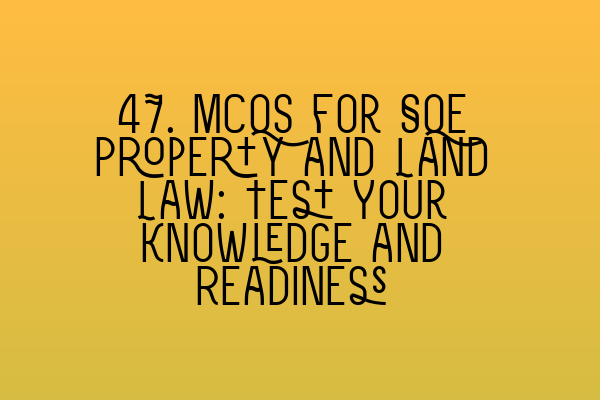47. MCQs for SQE Property and Land Law: Test Your Knowledge and Readiness
Welcome to SQE Property Law & Land Law, where we specialize in providing expert guidance for aspiring solicitors preparing for the Solicitors Qualifying Examination (SQE). In this blog post, we will present 47 multiple-choice questions (MCQs) to test your knowledge and readiness for the SQE Property and Land Law exam. Before we dive into the questions, let’s quickly review the importance of practicing MCQs and how they can enhance your preparation.
MCQs are a valuable tool for exam preparation as they force you to think critically, apply legal principles, and make quick decisions. By answering MCQs regularly, you can identify areas of weakness and focus your studies accordingly. Additionally, practicing MCQs helps improve your time management skills, which is crucial for success in the SQE exams. So, let’s jump right into the questions!
1. Which Act governs the ownership of land in England and Wales?
a) Land Registration Act 2002
b) Landlord and Tenant Act 1954
c) Law of Property Act 1925
d) Agriculture Act 2020
2. A registered proprietor is presumed to have good title, subject to:
a) Equitable easements
b) Adverse possession claims
c) Restrictive covenants
d) All of the above
3. In leasehold transactions, who is responsible for paying ground rent?
a) Lessor
b) Lessee
c) Both lessor and lessee
d) Solicitor
4. Which lease arrangement allows the tenant to continue occupying the property after the lease term has expired?
a) Fixed-term lease
b) Periodic lease
c) Tenancy at will
d) Tenancy at sufferance
5. Which type of notice is required to terminate a periodic tenancy?
a) Notice to quit
b) Section 25 notice
c) Section 21 notice
d) Notice of intention to vacate
6. Which Act allows leaseholders to collectively purchase the freehold of their building?
a) Leasehold Reform, Housing, and Urban Development Act 1993
b) Leasehold Reform Act 2002
c) Leasehold Property (Arbitration and Tribunal) Act 1993
d) Commonhold and Leasehold Reform Act 2002
7. Which interest takes priority over all other interests on a registered title?
a) Legal charge
b) Restrictive covenant
c) Easement
d) Freehold estate
8. What does the term “unilateral notice” mean in the context of land registration?
a) A notice that affects only one party’s interest in the land
b) A notice that requires the consent of both parties
c) A notice that is binding on both parties
d) A notice that is automatically registered with the Land Registry
9. Which section of the Law of Property Act 1925 governs the creation of legal easements?
a) Section 2
b) Section 205
c) Section 53
d) Section 15
10. What is the primary purpose of a land charge?
a) To secure a debt or obligation
b) To restrict the use of the land
c) To determine the boundary of the land
d) To transfer ownership of the land
Now that you’ve taken a sneak peek into the MCQs, why not test your knowledge and readiness by answering the remaining questions and discovering how well-prepared you are for the SQE Property and Land Law exam? Remember, practice makes perfect!
To continue reading the full blog post and access the complete set of 47 MCQs, click here: 47. MCQs for SQE Property and Land Law: Test Your Knowledge and Readiness
For additional SQE exam preparation resources, be sure to check out our related articles:
– SQE 1 Practice Exam Questions
– SQE 1 Practice Mocks FLK1 FLK2
– SQE 2 Preparation Courses
– SQE 1 Preparation Courses
– SRA SQE Exam Dates
We wish you the best of luck in your preparations for the SQE Property and Land Law exam. Remember to stay focused, stay confident, and stay committed to your success. Should you require any further assistance, our expert team at SQE Property Law & Land Law is always here to help. Happy studying!
